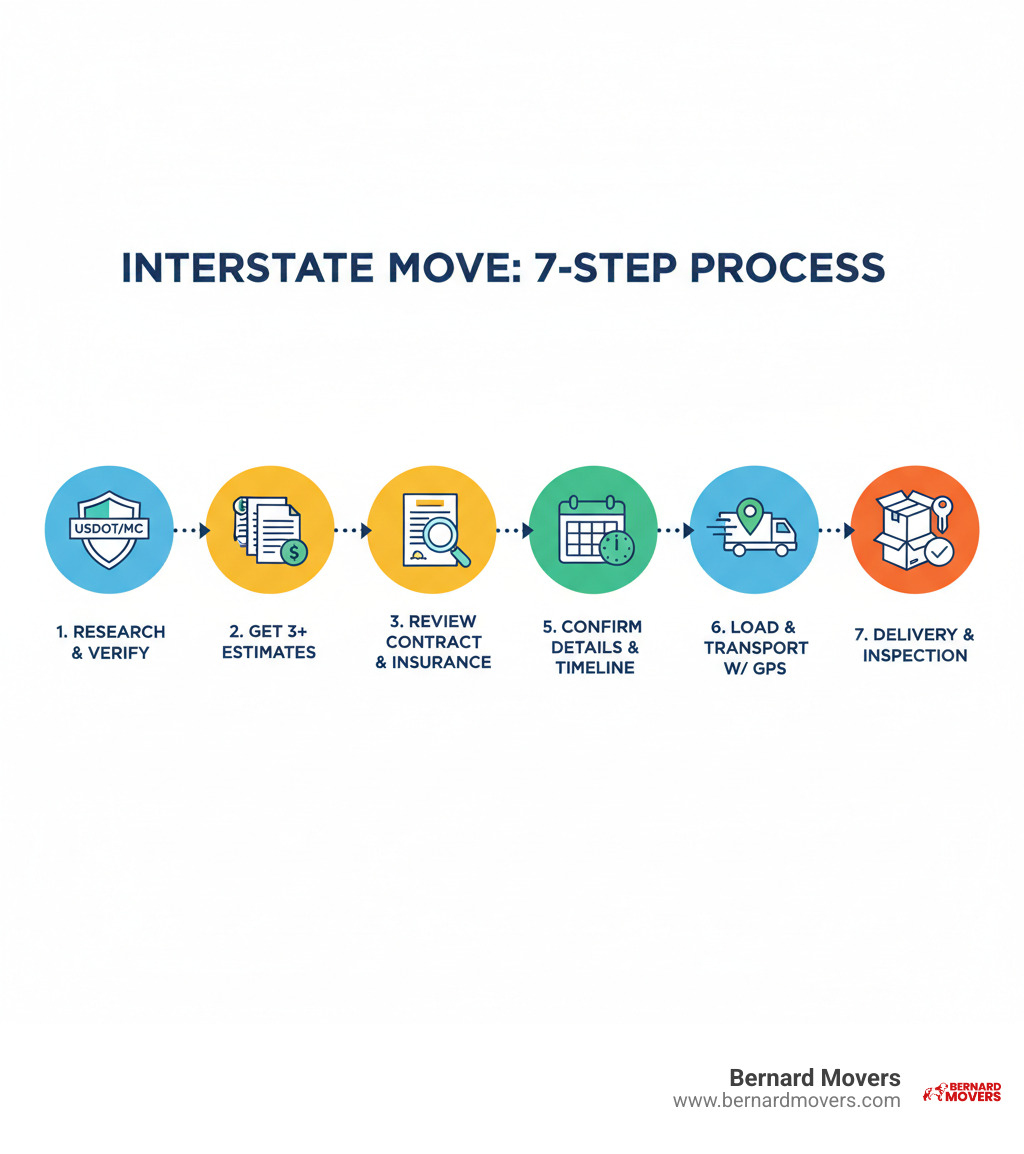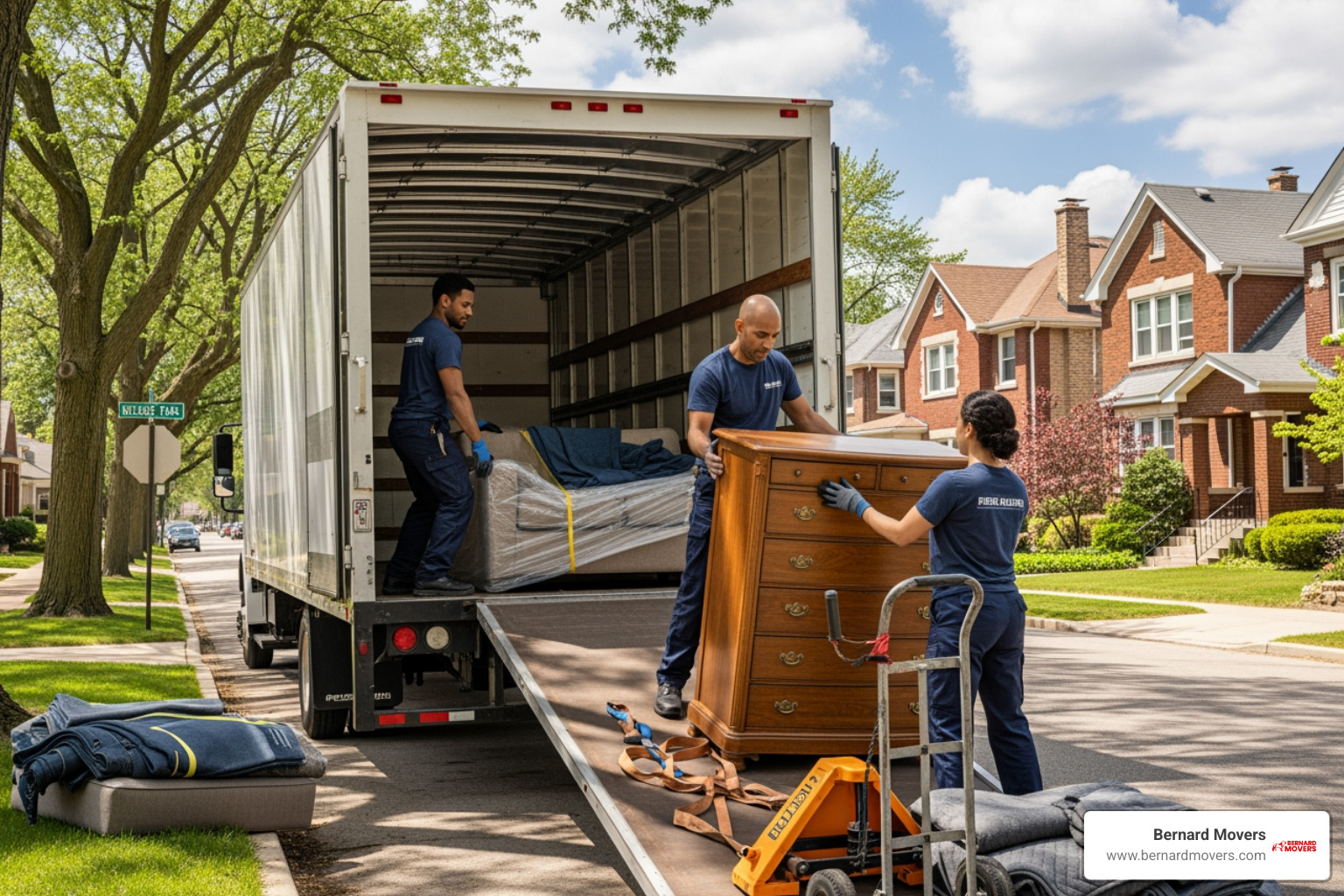Why Choosing the Right Moving Company Across State Lines Matters
Moving companies across state lines are federally regulated businesses that transport your belongings from one state to another. When you’re planning a move from Illinois to a new state, finding a trustworthy partner is critical. Unlike local moves, interstate relocations fall under federal rules designed to protect you.
This means your mover must have a valid USDOT and MC Number from the Federal Motor Carrier Safety Administration (FMCSA) and follow specific standards for pricing and insurance. Doing your homework is essential to avoid scams and find a reliable company that will deliver your belongings safely and on budget.
As Mina Georgalas, owner of Bernard Movers, I have nearly 30 years of experience guiding families through the complexities of interstate relocations. My goal is to help you understand how moving companies across state lines operate and make your long-distance move from Illinois as straightforward as possible.

Navigating Your Interstate Move: A Guide to Hiring Moving Companies Across State Lines
If you’re preparing to leave Illinois for a new state, the logistics of a long-distance move can seem complicated. However, with the right information and a trusted partner, your interstate relocation can be a well-orchestrated transition. In this section, we’ll walk through everything you need to know about moving companies across state lines—from understanding costs and services to choosing a reputable company and knowing your legal protections.

Defining Your Move & Understanding Costs
An interstate move is any relocation that crosses state lines, like moving from Chicago to Tennessee. Most professional moving companies across state lines consider moves over 400 miles to be long-distance, which involves different pricing and regulations than a local move.
The cost of moving across state lines depends on several factors:
- Weight and Volume: This is the biggest cost driver. The more you move, the more you’ll pay. A two- to three-bedroom home can start around $8,000, while larger homes can exceed $10,000.
- Distance: Moving from Illinois to a neighboring state costs less than a cross-country relocation.
- Timing: Prices are higher during the peak season (May-September) and on weekends.
- Additional Services: Professional packing, storage, and specialty item handling will add to your total cost.
My strongest recommendation is to get a binding estimate. A reputable mover will conduct an in-home or video walk-through to provide a locked-in price. This protects you from unexpected charges on moving day. Avoid non-binding estimates, which are only approximations and can increase significantly.
Types of Services and Add-Ons
Experienced moving companies across state lines offer a range of services to customize your move:
- Full-Service Moving: Professionals handle everything from packing and loading to transport and unpacking. This is a great option for busy families relocating from Chicago or Melrose Park.
- Partial-Packing Services: If you prefer to pack most items yourself, you can hire pros to handle fragile areas like the kitchen or home office.
- Storage Solutions: Short-term and long-term storage are available if your new home isn’t ready. Storage-in-transit can be a lifesaver during complex moves.
- Car Shipping: Avoid a long drive by having your vehicle transported with your household goods.
- Specialty Item Handling & Crating: For pianos, antiques, or artwork, custom crating and special handling provide maximum protection.
- Assembly and Disassembly: Movers can take apart and reassemble large furniture items for you.
Choosing Reputable Moving Companies Across State Lines
Choosing the right mover is the most important decision you’ll make. Here’s how to separate the pros from the scammers:
- Get Multiple Estimates: Contact at least three companies. This helps you compare prices and assess their professionalism. Insist on an on-site or video estimate for accuracy.
- Verify Credentials: This is non-negotiable. Every legitimate interstate mover must have a USDOT Number and an MC Number. You can and should verify these on the official FMCSA website. If a company can’t provide them, walk away.
- Check Reviews and References: Look at Google, Yelp, and the Better Business Bureau (BBB) for customer feedback. A good BBB rating indicates a commitment to ethical practices. Ask for and call references from recent long-distance clients.
- Assess Professionalism: Do they answer your questions clearly? Are their vehicles branded? Do they communicate promptly? Trust your instincts if something feels off.
Legal & Regulatory Essentials for Interstate Movers
Interstate moves are regulated by the Federal Motor Carrier Safety Administration (FMCSA) to protect consumers from moving fraud. By law, all licensed moving companies across state lines must provide you with a booklet titled “Your Rights and Responsibilities When You Move” at the beginning of the moving process. This is not just another piece of paper; it’s a critical document that outlines the terms and conditions of your move, the mover’s liability, and your responsibilities. Take the time to read it thoroughly, as it explains the entire process, including how to file a claim if something goes wrong.
A key area of confusion for many customers is the difference between valuation and insurance. It’s important to understand that movers do not sell insurance; they offer valuation, which is a predetermined limit of liability. This determines how much they will pay for your belongings if they are lost or damaged. You have two main options:
- Released Value Protection: This is the default, no-cost option that is automatically included in your contract unless you select otherwise. However, it offers minimal protection. The mover’s liability is limited to just 60 cents per pound per item. For example, if a 10-pound, $1,200 laptop is broken during the move, you would only be compensated for $6.00 (10 lbs x $0.60). This is clearly inadequate for most valuable items.
- Full Value Protection: This is a more comprehensive option that I strongly recommend for any interstate move. Under this plan, the mover is liable for the full replacement value of any lost or damaged items in your shipment. They have the option to either repair the item to its original condition, replace it with a similar item, or offer a cash settlement for the cost of the repair or the current market replacement value. This option costs extra—the price is determined by the mover based on the total valuation you declare for your shipment—but it provides significant peace of mind.
It’s also worth noting that you can purchase separate moving insurance from a third-party insurance company. This is different from the mover’s valuation and can cover events that valuation does not. If you have particularly valuable items like fine art, antiques, or collectibles, you may want to consider this additional layer of protection.
For more details, visit the FMCSA’s resource: Learn how to protect your move.
Preparing for a Smooth Relocation
Thorough preparation is key to a stress-free move.
- Create a Home Inventory: Document everything you own. This helps with insurance and ensures everything arrives.
- Declutter and Downsize: Movers charge by weight. Selling, donating, or discarding items you don’t need will save you money.
- Pack Smart: Start packing non-essential items early. Use sturdy boxes and quality materials. Label every box with its contents and destination room.
- Pack a “First-Night” Box: Include essentials like toiletries, medications, chargers, snacks, and a change of clothes. Keep this box with you.
- Keep Valuables Separate: Personally transport irreplaceable items like important documents, jewelry, and sentimental photos. Never put them on the moving truck.
- Know Non-Allowable Items: Federal law prohibits movers from transporting hazardous materials like propane tanks, paint, aerosols, and bleach. Your mover will provide a full list.
Avoiding Scams and Red Flags When Hiring Moving Companies Across State Lines
The moving industry has its share of scams. Stay vigilant to protect yourself.
- Low-Ball Estimates: An estimate that’s dramatically lower than others is a classic bait-and-switch tactic. The price will be inflated later.
- Large Upfront Deposits: A small deposit is normal, but a demand for a large percentage of the total cost upfront is a major red flag.
- No In-Home Estimate: A company that only offers a quote over the phone without seeing your belongings cannot be accurate and is likely planning to overcharge you.
- Vague Contracts: Never sign an incomplete or confusing contract. All services, costs, and dates should be clearly detailed.
- Lack of Licensing: If a company can’t provide a valid USDOT and MC number, they are operating illegally. Do not hire them.
- Unprofessional Appearance: Be wary of unmarked rental trucks, a lack of a physical business address, or high-pressure sales tactics. These are signs of an unreliable operator.
Finalizing Your Move and Choosing the Right Partner
Moving across state lines from Illinois is a significant life transition. By now, you understand the essentials of working with moving companies across state lines: vetting credentials, understanding costs, and preparing for moving day. You’ve learned to spot the red flags and are armed against common scams.

As you finalize your plans, confirm all dates and paperwork with your chosen mover. On moving day, do a final walkthrough with the crew and keep your “first-night” box and valuables with you.
At Bernard Movers, we have spent nearly 30 years helping families from Chicago, Melrose Park, and across Illinois with their long-distance moves. We follow every federal regulation, provide transparent binding estimates, and treat your belongings with care.
We proudly serve the greater Chicago area, including Des Plaines, Franklin Park, Park Ridge, Elmhurst, Wood Dale, Wilmette, Skokie, Morton Grove, Glenview, Mount Prospect, Evanston, Winnetka, Glencoe, Northfield, and Northbrook. To help with your transition, we’re offering a special 20% additional discount on moves from Illinois to Georgia or Florida booked for delivery by March 15, 2025.
Your new chapter is waiting. Let’s make sure you get there smoothly.
Learn more about our professional state-to-state moving services


